Board games are undergoing a Renaissance right now. The time when roll-and-move games ruled the roost, your progress dictated by the luck of the dice, has gone. Many modern board games test you on your ability to lie and manipulate, to spot the lies and manipulations of others, to bluff, bluster, and seize your opportunities to screw over your friends with brutal ruthlessness. These board games capitalise on what makes board gaming unique – the people sat around you at the table, and your relationships with them.
So, here are five more board games for bastards, ranging from crime and deduction to hardcore puzzling. They are all, it goes without saying, great fun to play.
Good Cop Bad Cop (4-8 Players, 20 minutes)
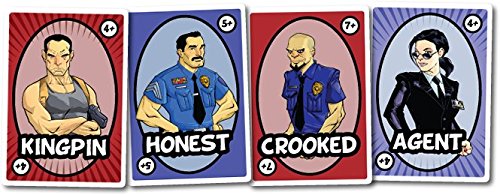
Overworld Games’ Good Cop Bad Cop feels like stepping right into the middle of a crime thriller like The Departed or Donnie Brasco. Players are police officers in a rotten organisation, trying to either root out or get away with police corruption. You will be dealt three role cards, and whether you are “Honest” or “Crooked” is determined by which type of card is in the majority. Two players will also be the faction leaders, the honest “Agent” or the crooked “Kingpin”. Players take turns investigating each other, looking at the other player’s role cards and slowly building a picture of who is working for who. Once you think you’ve found the enemy, you can aim your gun at another player, leaving them a single turn to try to convince you not to pull the trigger. Winning is simple – kill the opposing leader and win, but allow yours to be killed (or even pull the trigger yourself) and lose.
What makes Good Cop Bad Cop great is the steady drip of information and the decisions it brings. Sure, you now know that the player opposite you is crooked – but they also know you know, having watched you check out their cards. Do you dare pull a gun on them and make yourself a target, or do you bluff yourself into an alliance with them and risk being so convincing that your own side blows you away? Can you trust the player shouting that she knows who the enemy leader is, or is she trying to con you? Because every player starts knowing absolutely nothing about anyone, no-one is trustworthy and everyone is suspect, and table talk during and in-between turns usually tells you more than the actions you take. Truly skilled bastards can have manipulate others into dancing like puppets – if they don’t get shot first.
Mafia De Cuba (6-12 players, 20mins)
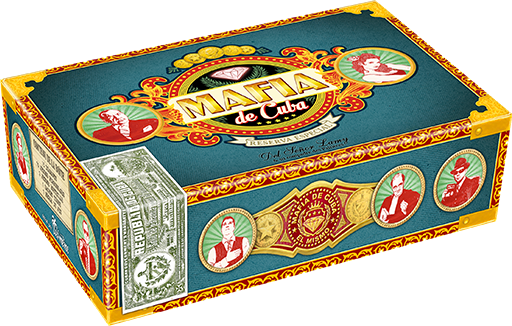
Mafia De Cuba, designed by Phillipe des Pallières and Loic Lamy, is another crime-themed social deduction game, but one with a difference – you choose your role. One of you is a 1950s Cuban Mafia Don waiting to receive a box of stolen diamonds. Before it reaches you, each of the other players looks inside and secretly determines their role – will they stay loyal and take a henchman token, will they become a thief and steal some or all of your diamonds, or become the CIA or FBI agent and win by being falsely accused? Once the now significantly lighter box returns to the Don, they must interrogate their gang and retrieve all of the stolen diamonds, without accusing too many loyal henchman or the agents.
Mafia De Cuba comes with lovely props: a replica cigar box, complete with a secret compartment to hold the diamonds and role tokens, heavyweight poker chips, and clear plastic diamonds that feel remarkably satisfying to steal. The game is tense and fast-paced as a single mistaken accusation can bring the Don down, and everyone has an angle they’re working. The Don questions the other players, who all have vital information from peeking in the box before deciding their own role, but the others are free to talk as much or as little as they want and no-one is obliged to ever tell the truth. Is that player helping the Don because they’re a loyal henchman, or are they sneakily sowing discord? Is someone remaining quiet out of guilt, or because they’re listening intently and working out who’s taken what? Mafia De Cuba suits confident groups who don’t mind being the centre of attention when it’s their turn to be Don, and some players will get a kick out of cracking out their best Godfather impressions and generally acting and talking like real-life Mafioso. Simple to learn and play, with a twelve player maximum Mafia De Cuba also suits a large gathering of terrible people.
The Amberden Affair (3-6 players, 60mins)
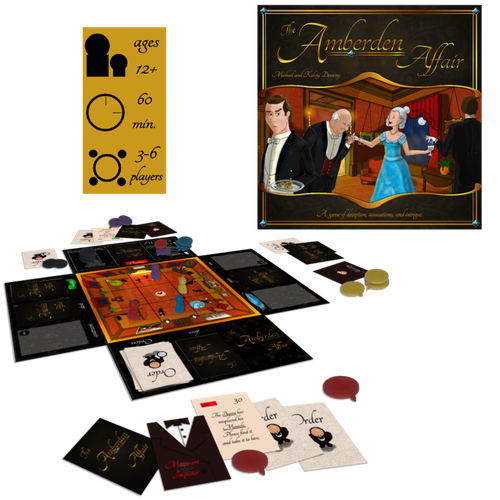
Two Penny Games’ The Amberden Affair plays like an Agatha Christie novel, with players acting as waiters, serving drinks and fulfilling requests at a grand Edwardian soiree for a variety of esteemed guests. The catch is that one of them is an assassin, using the party as the perfect cover to poison the visiting dignitaries.
The Amberden Affair revels in chaos – unlike most board games everyone acts simultaneously, trying to fulfil drinks orders for the dignitaries as well as investigating to try and find the hitman. Players move around the board at the same time, collecting orders from the maître d’, searching the room for what they want, or delivering items to the VIPs. This disorder allows the sneaky assassin to slip around unnoticed, acting like the others but serving murder rather than margaritas. Of course, you can hang back and try to work out what’s going on, but you will look suspicious and risk not completing any orders and thus score no points. At the end of reach turn players can declare their suspicion – if enough suspicion is declared, the round ends and players score points for the orders they’ve fulfilled and bonus points if they can successfully accuse the assassin, who in turn scores points for who she’s managed to kill and a bonus if they can get away with it. After three rounds, the game is over and the highest combined total wins.
The Amberden Affair is far more cut-throat than its genteel appearance and theme would suggest, and top-class bastards and bluffers will prosper. One of my fondest gaming memories is managing to divert suspicion long enough, due to some convincing table talk, to not only poison all the dignitaries but pin the murder on someone else. Oh, how I laughed at the saps I’d tricked and how I rolled in happiness amongst all my glorious, ill-gotten points, and my new-found lack of friends.
Portal: The Uncooperative Cake Acquisition Game (2-4 players, 30-45mins)
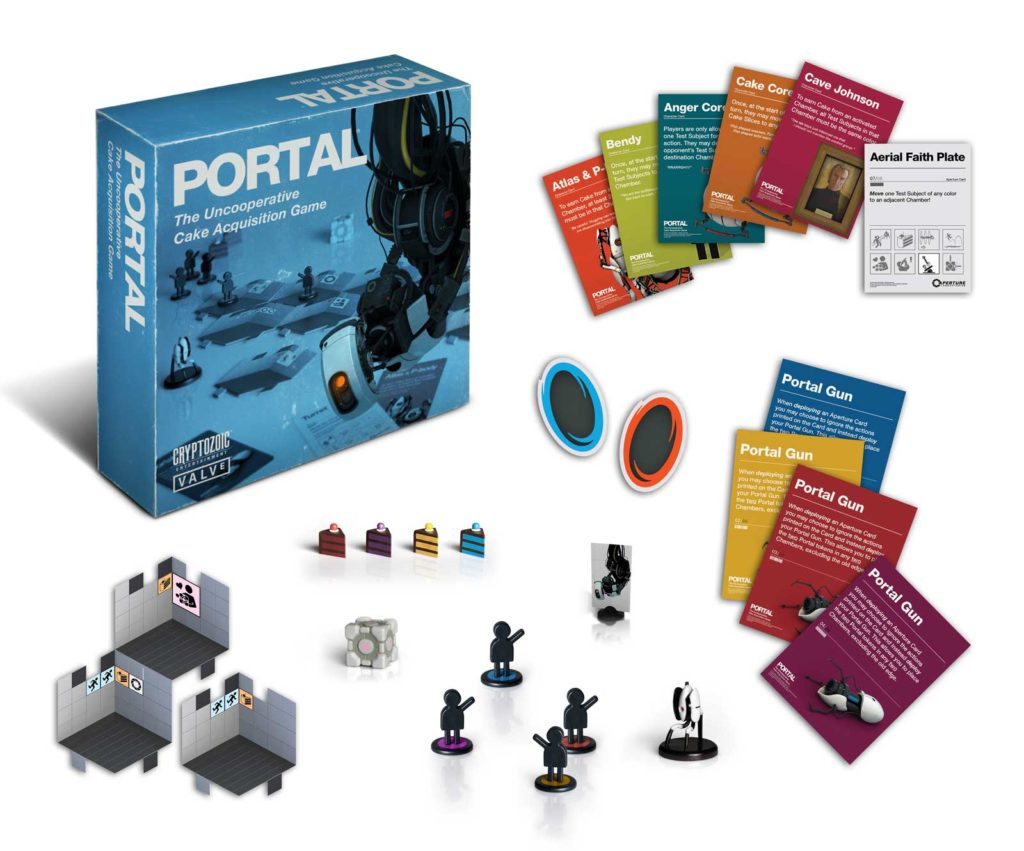
Cryptozoic Entertainment are the masters of the tie-in board game. The Portal board game manages to create a table-friendly version of the popular video game series, replicating both its mind-bending puzzles and its dark sense of humour.
Players take turns moving test subjects around a conveyor belt of test chambers, then recycling one of the chambers at the board’s edge. Recycled chambers kill any subjects in there but the player with the most deaths earns rewards: extra subjects, Portal staples such as gun turrets or companion cubes, and sweet delicious cake. The chamber is then flipped and placed at the new end of the conveyor belt. Players can also earn and use ability cards, modelled after characters from the games, gaining a one-time bonus but also activating a universal special rule that all players can take advantage of (or be screwed over by). The game ends when one players loses all their subjects, the winner being the player with the most cake on the board.
Portal is the kind of game where minutes can pass in silence as players plot and scheme and weigh their options. No plan is foolproof, however, and you’ll need to make and break alliances and gang-up on the powerful in order to claim victory for yourself. Players are encouraged to be absolute dicks to each other if they want to win. The best part is picking up your opponent’s cake and running towards the recycling edge of the board with it. Get it there as a chamber is recycled and you have the joy of taking those hard-won slices and gleefully dropping them into the cardboard incinerator, taking them out the game for good. Evil laughter isn’t strictly required but highly recommended at that point. Portal doesn’t just encourage you to be mean, it thrives on it.
Welcome To The Dungeon (2-4 players, 30mins)
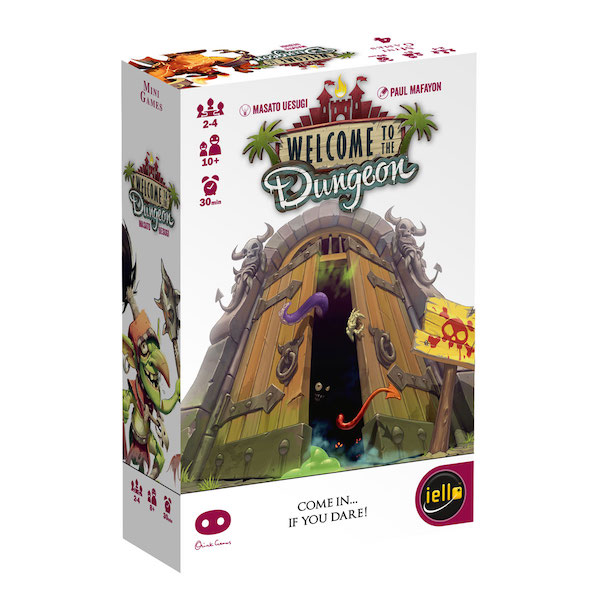
Iello’s Welcome To The Dungeon is a game of laying traps and hoping you aren’t pushed onto them by the other players. Each round starts with a choice of hero from the four stereotypes provided (warrior, barbarian, rogue, and mage), each of which has six unique pieces of equipment to aid them in clearing out a dungeon in search of glory. Players win by either completing two dungeons themselves, or being the last player left standing after each of their opponents has failed twice. Each turn you draw a monster card and either add it face down to the dungeon, or place it face-down in front of you and remove one of the hero’s pieces of equipment. Alternatively you can pass; the last player not to pass then has to try and make it through the dungeon with whatever meagre equipment remains.
Every move in Welcome To The Dungeon is a bastard move. So, the warrior has a magic weapon that can kill the mighty demon in a single hit, so wouldn’t it be a shame if you added the demon in one turn and removed the weapon the next? Of course, if all the other players pass you’ll then have to run headfirst into your own trap…
You can be wonderfully nasty in Welcome To The Dungeon, laughing as your opponents run face first into terrible monsters and death, or keep pushing your luck and make it through your opponents’ traps by the skin of your teeth and seizing victory from the jaws of a defeated dragon. Like biker favourite Skull and Roses, each round has a tipping point where everyone is second-guessing everyone else, knowing that pressing on could result in catastrophe but passing could surrender victory. Screwing people over while keeping a straight face is the real skill here.
If these games aren’t enough of an excuse to lie, cheat, and generally use gaming night as an excuse to act like a terrible person, don’t forget to check out our previous list of games that let you be a dick to your friends.